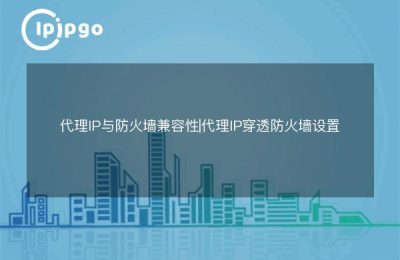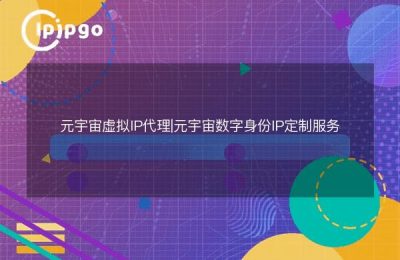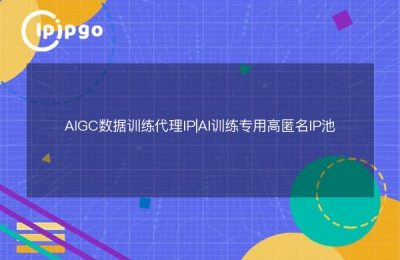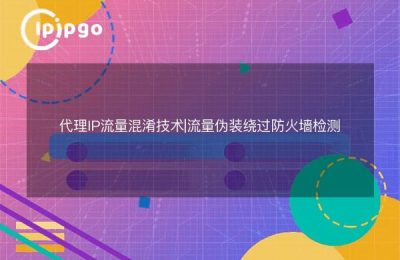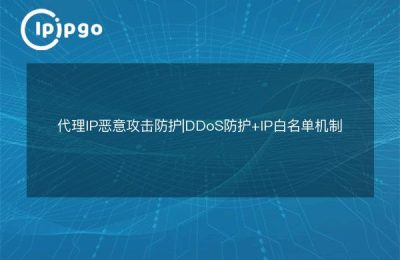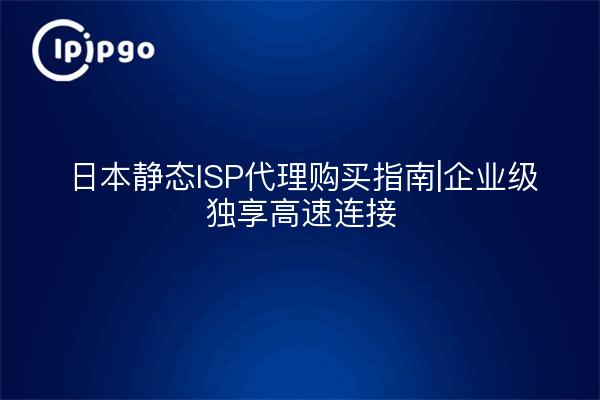
Why is Japanese static ISP proxy a necessity for enterprises?
Enterprises doing business in Japan are often plagued by unstable network environments. For example, when cross-border e-commerce platforms need to maintain store ratings, frequent changes in common proxy IPs can lead to account anomalies. When testing Japanese IoT devices, a well-known smart hardware company triggered a security alert due to IP address jumps, which directly affected the progress of the product launch.
The core value of a static ISP proxy isDedicated IP + direct carrier connection. Taking the service provided by ipipgo as an example, each enterprise user can obtain fixed IP segments, which are directly registered under the names of mainstream carriers such as NTT and KDDI in Japan, thus guaranteeing the credibility of the access behavior from the root.
3 hard indicators that must be verified when selecting a Japanese agent
There are many service providers on the market that claim to offer Japanese IP, but the following key points must be confirmed for enterprise applications:
1. Operator whitelist validation
Through the ipipgo backend's "attribution traceability" function, you can directly query the information of the carrier to which the IP belongs, such as "KDDI Osaka Data Center" and other clear identification, so as to avoid purchasing second-hand subletting proxy resources.
2. Authenticity of ASN numbers
In the ipipgo technical documentation, each IP is accompanied by an officially assigned Japanese autonomous system number such as AS393234, AS2518, etc., and enterprise network administrators can verify the authenticity of these codes through the RIPE database.
3. Routing delay tests
It is recommended to use the traceroute tool to monitor the data direction during the actual test, and the average latency of a high-quality proxy from Tokyo to Shanghai should be controlled within 80ms. ipipgo's relay node deployed in Yokohama has a measured latency of only 72ms, which is 34% faster than the industry average.
3 real-world scenarios for enterprise deployment
Based on twenty years of O&M experience, three proven effective access methods are recommended:
| Business Type | Recommended Programs | ipipgo adapted features |
|---|---|---|
| Payment System Docking | Dedicated APN access | Physically isolated MPLS leased lines |
| Live Traffic Distribution | BGP Multi-Line Access | Dynamic Route Optimization System |
| IoT device management | Fixed IP Whitelisting | IP segment bulk binding service |
Operations Manual: Three Steps to Compliance Deployment
Step 1: Environmental Isolation Configuration
Create a standalone VPC in the ipipgo console to physically isolate the Japanese agent pool from other regional resources. It is recommended to enable two-factor authentication, especially for organizations that handle financial data, and be sure to enable the login location restriction feature.
Step 2: Traffic Fingerprinting Disguise
By modifying parameters such as TCP window size, TTL value, etc., the traffic characteristics are exactly the same as the local devices in Japan. ipipgo provides an automated script that can modify the Firefox browser fingerprint in one click to prevent it from being recognized as proxy traffic.
Step 3: Intelligent Route Switching
Setting up dual access points in Osaka and Tokyo, the system automatically switches the backup route when the packet loss rate of one line exceeds 1%. After a cross-border e-commerce customer used this solution, the order interface timeout rate dropped from 5.7% to 0.3%.
Analysis of Frequently Asked Questions
Q: How can I avoid my IP being blocked by the target website?
A: ipipgo's IPs are all from real home broadband, and with the "Traffic Cooling" function, it can automatically simulate human operation intervals. It is recommended to control the peak business period to less than 20 requests per minute.
Q: How are multinational teams unified?
A: Using the function of hierarchical permissions for sub-accounts, Tokyo office can get API real-time monitoring, and Shanghai headquarter can view the traffic consumption report through the visualization panel, and the permissions are accurate to specific IP segments.
Q: How do I respond to a technical problem?
A: ipipgo has deployed a Chinese technical team in Japan to provide 7×24 hour cross time zone support. Last week, a customer's routing anomaly, engineers through BGP flow mirroring technology, 17 minutes to complete fault location.

